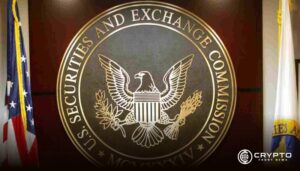- Ripple’s $144M donation to SuperPACs influenced 2024 elections, with 85% of crypto-backed candidates winning.
- Ripple’s legal fight with the SEC has cost over $150M; XRP ruled not a security by a federal judge.
- Bipartisan FIT 21 bill proposes shifting crypto oversight to the CFTC, aiming to clarify U.S. regulations for digital assets.
Brad Garlinghouse, CEO of Ripple, appeared on CBS’s 60 Minutes to discuss cryptocurrency’s growing influence in U.S. politics and regulation. The interview, conducted by Margaret Brennan, explored the industry’s role in recent elections, its ongoing regulatory battles, and its future.
Garlinghouse highlighted Ripple’s contribution to shaping the digital asset sector, while also challenging the narrative that cryptocurrencies lack utility. The conversation delved into Ripple’s legal fight with the SEC, the industry’s lobbying efforts, and the broader implications of crypto adoption.
Crypto’s Role in U.S. Elections Gains Momentum
Garlinghouse emphasized the substantial financial contributions made by crypto firms in the 2024 elections. Notably, Ripple and two other companies collectively donated $144 million to SuperPACs supporting pro-crypto candidates.
These efforts significantly influenced electoral outcomes, with 85% of the industry-backed candidates winning their races. This included victories for key figures like Republican Bernie Marino in Ohio and Democratic senators Alyssa Slotkin and Ruben Gallego.
The crypto industry’s political spending, Garlinghouse argued, aimed to ensure policymakers understand and support emerging technologies. He described the contributions as a means to “educate voters” and advocated for the creation of clear regulatory frameworks for digital assets. However, critics like former SEC official John Reed Stark accused the industry of attempting to “buy elections,” raising questions about transparency and ethics.
Ripple’s Legal Battle with the SEC Remains Central
The interview also revisited Ripple’s ongoing legal dispute with the SEC. In December 2020, the SEC sued Ripple, alleging that its digital asset, XRP, was an unregistered security. Garlinghouse defended Ripple’s stance, stating that XRP facilitates cross-border payments efficiently and operates within regulatory frameworks. He criticized the omission of a federal judge’s ruling that XRP is not a security, calling it a pivotal point in the lawsuit.
John Reed Stark, a former SEC official, maintained that XRP should be classified as a security, citing repeated judicial opinions to support his claim. Despite the legal challenges, Garlinghouse revealed that Ripple has spent over $150 million in its defense, showing the stakes involved in setting a precedent for the crypto industry.
Crypto Regulation: A Divided Space
Another focal point was the proposed legislation, FIT 21, which aims to clarify the regulatory responsibilities between the SEC and the Commodity Futures Trading Commission (CFTC). The bill, which passed the House with bipartisan support, shifts certain oversight powers to the CFTC, a move welcomed by many in the industry. Garlinghouse advocated for such frameworks, arguing that clear rules would foster innovation and prevent pushing the industry offshore.
Meanwhile, Garlinghouse noted the industry’s broader adoption, citing Ripple’s use of XRP for billions in Know Your Customer (KYC)-compliant cross-border transactions. He also highlighted the shift in sentiment, with major financial institutions like JPMorgan now embracing blockchain technology. Despite skepticism from figures like Jamie Dimon, the success of Bitcoin ETFs this year further underscored crypto’s integration into mainstream finance.





